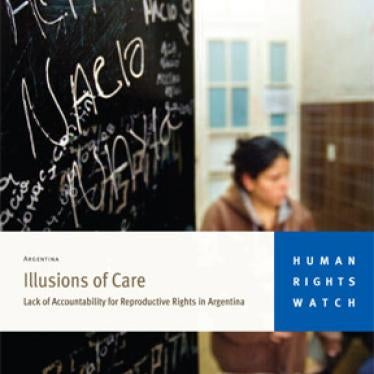In five days I will be addressing Argentina's House of Representatives about abortion. The occasion is as deliberately momentous as it is intentionally inconsequential. On the one hand, this is the first time Argentina's national congress has debated the legalization of abortion, and the hearing has been advertised in the national media for weeks. At the same time, the opening of this landmark debate has been scheduled in the last hours of the last legislative session this year, on a day of the week usually reserved for internal meetings.
This "schizophrenic" attitude reflects the way Argentina's government and congress have dealt with sexual and reproductive rights for decades.
On the face of it, Argentina has an impressive array of relatively well-defined and balanced laws and policies on the topic. Comprehensive sex education is mandatory in all schools. Laws stipulate that a spectrum of modern contraceptive methods must be available free through the public health system. The law also says that older adolescents must be allowed access to the medical care they need without parental authorization. And in July, President Christina Fernández de Kirchner took on the Catholic church to make Argentina the first country in Latin America to recognize same-sex marriage. Notably, abortion has been legal for more than a century for women and girls whose lives or health is threatened by their pregnancy, or when the pregnancy is the result of rape or incest.
But the law is one thing. Real access to information, services, and rights is quite a different matter. In 2005 and 2010, Human Rights Watch analyzed women's and girls' effective enjoyment of their human rights as they relate to sex and reproduction. Our conclusions were unfavorable. We found that multiple barriers keep Argentina's women from making independent decisions about their health and lives in the area of reproduction -- lack of information, inaccurate and incomplete information, domestic and sexual violence, and economic restraints the government has not addressed adequately.
We also found that the failure to remove these barriers comes at a real cost. Even today, an estimated 40 percent of pregnancies end in abortions, most of them illegal and unsafe. This in turn contributes to entirely preventable maternal deaths. In fact, unsafe abortion has been a leading cause of maternal mortality in the country for decades. In 2008, according to Argentina's national health ministry, over 20 percent of recorded deaths due to obstetric emergencies were caused by unsafe abortions.
Part of the problem is the politicization of issues related to motherhood, population growth, and, at the most basic level, sex. Argentina was one of the last countries in the Latin America region to abandon a top-down population policy approach that subjected individual decision-making to a nationalist interest in population growth. Until 1985 the sale and use of contraception was entirely prohibited, and even medical service providers still justify actions that curtail women's human rights by referring to a century-old maxim, "to populate is to govern." As recently as 1999, the government declared an annual national "Day of the Unborn Child," which some people still celebrate.
It is also true that any law that labels abortion a crime, even if it allows for exceptions, in practice makes it complicated -- if not impossible -- to get access to life- and health-preserving abortions. This is the situation in Argentina. Often, women are unaware of the circumstances in which they could legally get an abortion. Women who do seek them may be stonewalled by complicated procedures and hostile service providers in the health and justice systems. Many women with crisis pregnancies go directly to underground service providers, though some end up in the courts arguing for their right to health care, with varying success.
Much will be at stake when Argentina's parliament starts debating the legalization of abortion: women's lives, health and rights, as well as Argentina's reputation as a modern democracy respectful of human rights. I am honored to have been invited to take part in this debate. I hope the scheduling of the hearing is an indication of a busy congress rather than a symptom of the same erratic and selectively dismissive attitude that has plagued Argentina's engagement with this topic for years.







